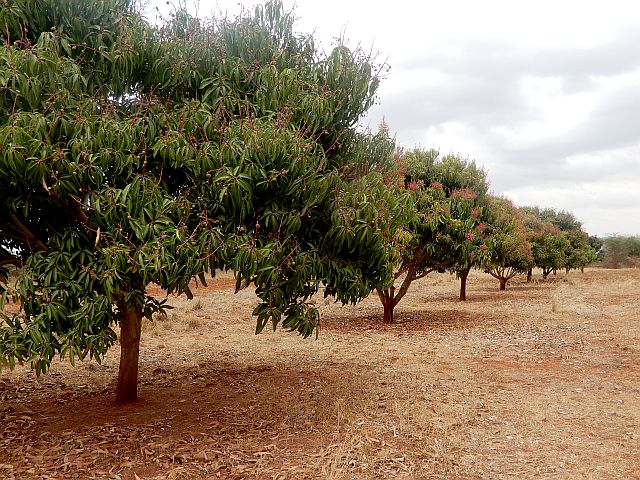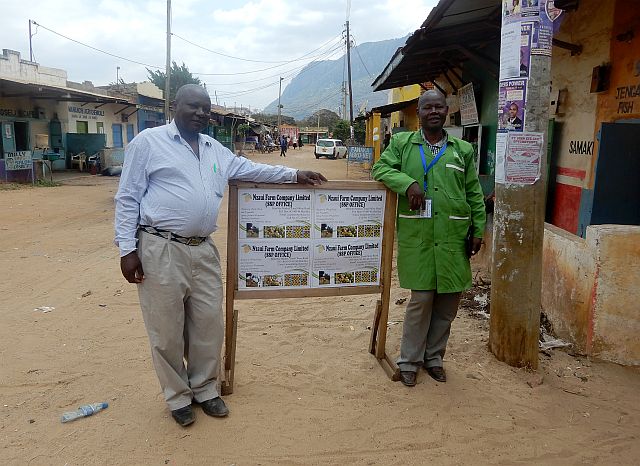A few kilometres off the Nairobi-Mombasa motorway lies the town of Matiliku, Makueni County. The area is characterised by fertile red soil, scattered vegetation and the majestic Nzaui hill, and it is home to some of Kenya’s best mangoes and citrus fruit.

Correct spacing of mango trees promotes healthy growth and higher yields
Isabella Mbuya, a farmer and retired teacher, derives her livelihood from fruit farming near the Nzaui hill. For Isabella and her family, farming is a worthwhile venture which feeds them and provides a source of income.
She and her husband ventured into mango production nearly 20 years ago, armed with the knowledge acquired from tending lemon trees. However, a dry spell that first year reduced the number of seedlings from 100 to 15, and the trees yielded no more than a single box of fruit.
Determined to succeed, Isabella and her husband looked for ways to improve their farming activities. They decided to engage the services of Benson Mulinge, a local spray service provider, who has been instrumental in advising and providing pest control services to farmers in Makueni.
Benson is a beneficiary of the Market-led Horticulture Programme (HortIMPACT). This Kenyan programme is implemented by a consortium led by the Netherlands Development Organisation (SNV), with the participation of Solidaridad, fellow nonprofit Hivos and agricultural specialist Delphy.
Changing weather patterns and limited access to government extension services in Makueni often affected production. HortIMPACT stepped in to professionalise spray service providers, facilitating training in agrochemical management and delivery of good farming practices to local farmers.
Isabella acknowledges that it was difficult at first to embrace new farming activities, such as uprooting trees that had been planted too close together. However, she can see that the quality and quantity of her produce have both gone up because she listened to professional advice.
I have earned enough to buy a farm because of my expertise” – Judah Kimeu, self-employed spray service provider
Thanks to the HortIMPACT training, spray service providers began scouting pest and disease thresholds in Makueni and other nearby counties, handling pesticides responsibly, and driving back the use of counterfeit and banned products.
Judah Kimeu, a self-employed spray service provider trained under the HortIMPACT project, has worked with farmers since 2006. Demand for his services has risen since more farmers entered the horticulture sector.
“I have been able to earn enough to provide for my family and even buy a farm because of my expertise,” says Judah. He has also improved his livelihood opportunities, upgrading his equipment to include a motorized backpack sprayer and buying a motorcycle so he
can reach more farmers.

Judah Kimeu, wearing safety overalls provided through the HortIMPACT project
As more farmers shifted from subsistence farming to horticulture, they encountered the problem of middlemen who manipulated the market and set prices which did not favour the farmers. In response, the farmers united, forming the Nzaui Farm Company Limited in 2015.
“Our organization was established as a result of increased mango production and the need to find a ready market which eliminates middlemen,” says Anthony Kimeu, Director of the Nzaui Farm Company. With over 800 smallholder members, it can aggregate produce, provide technical support to farmers and look for competitive markets for their produce.

Anthony Kimeu and Sammy Ndivo of Nzaui Farm Company outside the organization’s offices in Matiliku, Makueni County
The association is affiliated with the Makueni Service Providers Association, which has a membership of 300 service providers. As a result, farmers in Makueni County are reaping the benefits of switching to horticulture. Producing high quality produce that complies with food safety standards has improved livelihoods.
HortIMPACT seeks to enhance food security and improve incomes of small- and medium-sized farmers by promoting a sustainable, market-driven horticulture sector. It combines private sector expertise with social impact solutions to build sustainable, inclusive domestic and export horticulture markets in Kenya. It supports high potential businesses and innovations which address inclusion of smallholder farmers, improvement of food safety and reduction of food losses.
